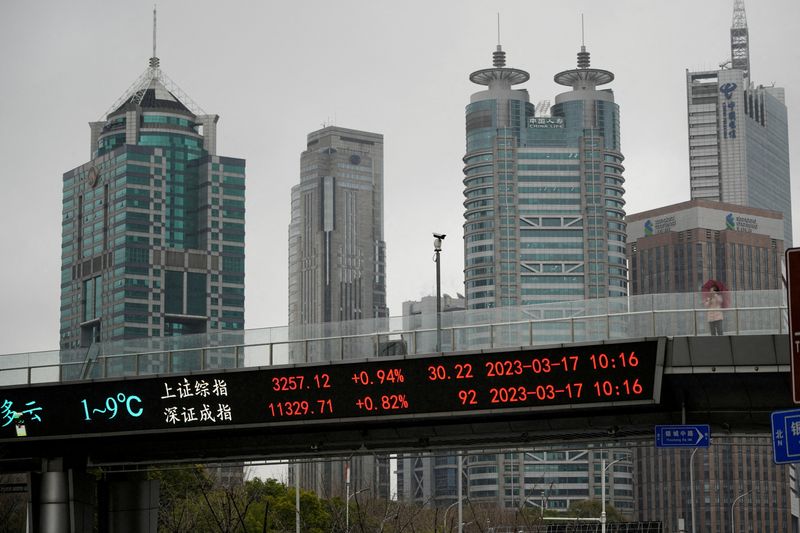[ad_1]

© Reuters. FILE PHOTO: An electronic board shows Shanghai and Shenzhen stock indices at the Lujiazui financial district in Shanghai, China, March 17, 2023. REUTERS/Aly Song/File Photo
By Xie Yu and Selena Li
HONG KONG (Reuters) – Harvest Fund Management, which manages $210 billion in assets, has laid off more than one-third of its staff at its Hong Kong unit as the leading Chinese asset manager pulls back from foreign business, two sources with knowledge of the matter said.
The impacted staff at the Hong Kong unit, Harvest Global Investment (HGI), received notices this week to leave the firm within three months, the sources said, in a move that comes as foreign investors’ appetite for Chinese stocks remain weak.
HGI, with about 40 employees based in Hong Kong, is the main offshore operation of Harvest Fund – a China joint venture in which Deutsche Bank’s asset management arm DWS currently owns 30% stake.
The layoff came after HGI saw foreign capital inflows drying up, said the sources. The unit will gradually wind down most of its retail funds domiciled in Hong Kong and Europe, only keeping an outbound investment function for Chinese clients, they added.
The development underscores the challenges Chinese asset managers are facing, as foreign capital inflows diminish and the country grapples with a slowing economy amid a protracted crisis in the property sector and local government debt travails.
The $3.8 trillion mutual fund industry in China is also reeling from shrinking margins amid sluggish sales and Beijing’s call to cut fees.
A third source with knowledge of the matter said that the HGI layoffs was part of the asset manager’s strategy overhaul that would transfer most of the functions of serving foreign clients from Hong Kong to Beijing.
Harvest is one of the first Chinese asset managers to make sizable layoffs in Hong Kong in recent years.
The asset manager’s job cuts in Hong Kong add to headcount reductions by global investment banks in the city over the past year, as slowing investments and deals in Greater China cast a shadow over the prospects of the Asian financial hub.
All sources spoke on condition of anonymity because the information was not public.
A Harvest Fund spokesperson said HGI does not have plans to stop serving foreign clients or shutting down retail funds. The parent will provide more support to HGI for serving clients, said the spokesperson, without commenting on the layoffs.
HGI did not respond to Reuters requests for comment.
Reuters reported on Tuesday, citing sources, that Thomas Kwan, chief executive of HGI had stepped down, and he would be replaced by Han Tongli, a portfolio manager at the fund manager’s Hong Kong unit.
DIMINISHING FOREIGN INTEREST
Beijing-headquartered Harvest Fund ranked as China’s 6th largest public fund manager excluding money-market fund assets as of September, data from China’s asset management association shows.
Established in 2008, its Hong Kong unit has been helping the group with outbound investments by Chinese investors and inbound investment by foreign investors, the two sources said.
HGI has been running foreign business mainly through the so-called Qualified Foreign Institutional Investor programme, which allows foreign clients to access Chinese onshore equities and bonds.
The Hong Kong unit currently manages at least seven retail funds and exchange-traded funds, with total assets worth more than $78.1 million, data by Morningstar shows.
Diminishing foreign interests in Chinese securities amid deepening concerns about the country’s slowing economy and intensifying competition to win over foreign investors weighed on the unit’s business prospects, the sources said.
In December, global long-only funds retreated from China stocks at the fastest pace for 2023 as they rushed to meet redemption requests and to diversify away from the world’s second-largest economy, according to Morgan Stanley analysts.
China’s stock market was among the worst performers globally in 2023, with the blue chip CSI300 index closing the year with 11% losses, against a 20% gain for global stocks.
The performance has resulted in a string of foreign sovereign funds, pension funds and hedge funds shutting offices or laying off teams in China while cutting back exposure to Chinese assets.
[ad_2]
Source link
